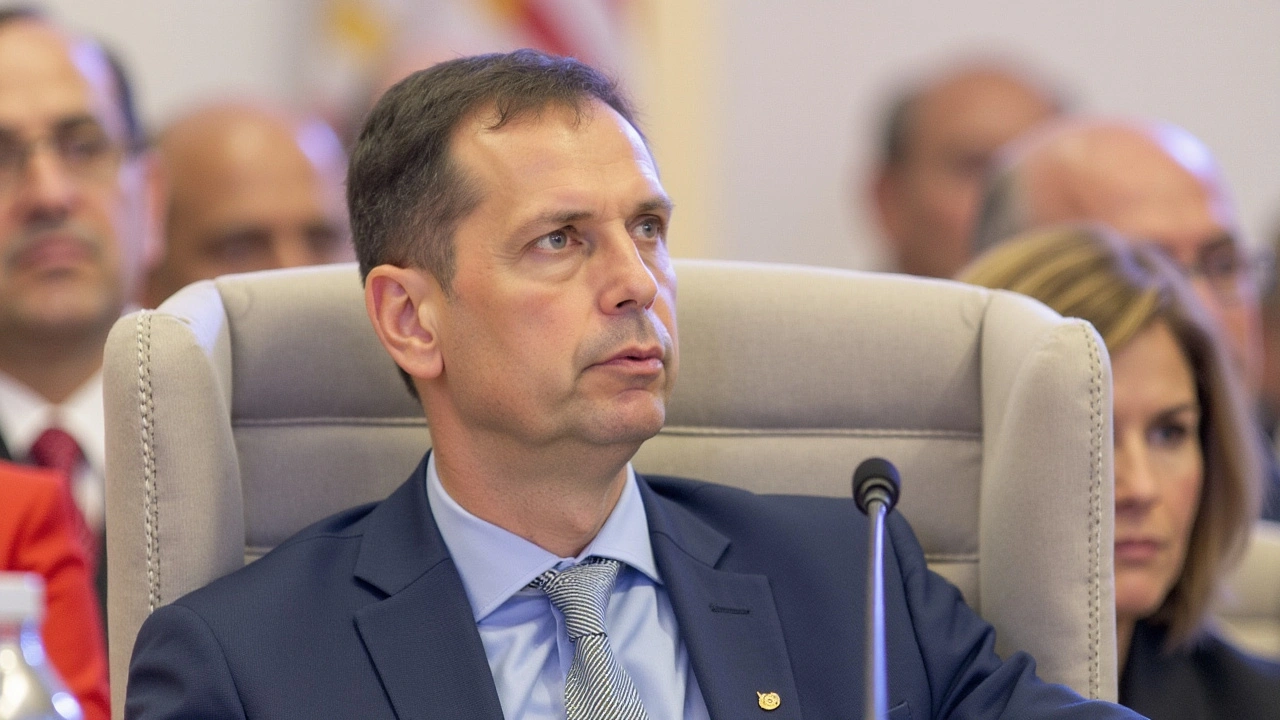Syria's Future After Assad: A Shattered Nation Rebuilding from Repressive Ruins

The Downfall of the Assad Regime: End of an Era in Syria
The fall of the Assad regime, led by Bashar al-Assad, marks a monumental shift in the complex landscape of Syrian politics and society. For over fifty years, the Assad family maintained a tight grip on power, their rule characterized by severe repression and allegations of extensive human rights abuses. Today, as the regime crumbles, Syria stands at a crossroads, faced with the daunting task of rebuilding a nation scarred by years of civil war.
A History of Repression, A Legacy of Pain
Under the leadership of the Assad family, Syria was governed with an iron fist. Critics of the regime faced harsh repercussions, and allegations of systematic torture and mass killings plagued the country. Bashar al-Assad, who succeeded his father Hafez al-Assad, continued these oppressive practices, which escalated dramatically during the Syrian civil war. The international community has accused him of numerous war crimes, including the use of chemical weapons in attacks like Ghouta in 2013 and Khan Shaykhun in 2017. The images of these assaults left a permanent stain on the world's conscience and amplified Syria's plight.
The Toll of Civil War
The Syrian civil war, ignited in the wake of the Arab Spring, has been one of the most devastating conflicts of the 21st century. An estimated 580,000 people have lost their lives in the conflict, including at least 306,000 innocent civilians. Families have been torn apart, and entire cities reduced to rubble. Economic collapse and humanitarian crises have compounded the suffering of a people longing for peace and stability. The destruction extends beyond physical structures; it has woven itself into the very fabric of Syrian society.
International Condemnation and Calls for Justice
The Assad regime's actions have not gone unnoticed on the global stage. Organizations like the American Syrian Accountability Project have listed Bashar al-Assad in war crimes indictments. The United Nations, led by figures such as Navi Pillay, the then-UN High Commissioner for Human Rights, has pointed fingers at the Assad regime, holding it accountable for heinous acts against the Syrian people. Efforts to bring Assad to justice have included international legal actions, such as the lawsuit filed by Canada and the Netherlands at the International Court of Justice, accusing the regime of violating the UN Convention Against Torture. France has gone further, issuing an arrest warrant over the use of banned chemical weapons against civilians.
The Influence of Iran and Regional Dynamics
The fall of the Assad regime represents a significant strategic loss for Iran, which heavily supported Assad as part of its "Shiite axis" policy. Despite the extensive backing, including military and financial resources, Assad's inability to maintain power even with Iran’s support highlights the fragility of such alliances. Key Arab nations like Saudi Arabia and the UAE have made attempts to normalize relations with Syria, aiming to distance Assad from Iranian influence. However, his steadfast ties with Tehran have proven a sticking point, exacerbating his isolation both regionally and internationally.
Post-Assad Syria: Paving the Road to Recovery
As opposition forces gain control over strategic areas of the country, including Damascus, Syria steps into an uncertain future. The enormity of the rebuilding effort cannot be overstated. Experts estimate it will take at least a decade to restore Syria's battered economy, a process fraught with challenges. Reconstructing infrastructure, fostering economic growth, and healing societal divisions are monumental tasks that require not only domestic resolve but international aid and cooperation.
Hope Amidst the Ruins
Despite the grim past, the collapse of the Assad regime offers a glimmer of hope. It presents an opportunity for Syria to redefine itself, emerge from the shadow of dictatorship, and embrace a future anchored in democracy and respect for human rights. The resilience of the Syrian people, combined with global support for reconstruction and justice, may pave the way for a more peaceful and prosperous nation.
The story of Syria post-Assad is still being written, and the road ahead is undoubtedly fraught with obstacles. Yet, it is a path that promises new beginnings, an evolution from tyranny to a governance system that prioritizes the will and welfare of its people. As Syria navigates this critical juncture, the lessons of the past remain vital in shaping a future that honors the sacrifices of its people and builds upon their undying spirit.






Kara Withers
December 8, 2024 AT 18:13The humanitarian corridors that opened after the regime's collapse could serve as vital lifelines for displaced families.
boy george
December 8, 2024 AT 18:47One must consider the geopolitical vacuum left by Assad's exit. It invites a recalibration of power structures in the Levant.
Cheryl Dixon
December 8, 2024 AT 19:20The vacuum left by the Assad dynasty forces a reexamination of Syria’s national identity.
One might argue that the entrenched authoritarian narrative has been replaced by a chorus of fragmented aspirations.
Yet the scars of chemical attacks linger as a stark reminder of past atrocities.
The diaspora, now scattered across Europe and the Americas, carries both trauma and potential expertise for reconstruction.
Regional actors, from Iran to Turkey, will inevitably contest the emerging power balance.
International legal mechanisms, though sluggish, could provide a framework for transitional justice.
The economic infrastructure, reduced to rubble in Aleppo and Homs, demands unprecedented investment.
Water scarcity, aggravated by climate change, will challenge any agrarian revival.
Civil society groups are beginning to mobilize, offering grassroots governance models.
Education reform, particularly in de‑radicalizing curricula, will be essential for long‑term stability.
The Kurdish political factions, having fought on multiple fronts, now seek recognition within a united Syrian polity.
Women, who bore the brunt of wartime losses, are emerging as pivotal community leaders.
Media narratives, often polarized, must shift towards constructive storytelling.
The next decade will test whether the international community can move beyond rhetoric to actionable aid.
Ultimately, the Syrian people’s resilience will determine whether a shattered nation can truly be rebuilt.
Ramesh Modi
December 8, 2024 AT 19:53Indeed, the moral calculus of the post‑Assad era demands an uncompromising stance, for the victims of torture and chemical horrors deserve more than hollow proclamations, and we must, with solemn duty, demand accountability, reconstruction, and a decisive break from the culture of impunity that has haunted the nation for decades!
Ghanshyam Shinde
December 8, 2024 AT 20:27Oh, absolutely, because the world has never prioritized justice before-just look at the endless meetings and what they’ve achieved so far.
Charlotte Louise Brazier
December 8, 2024 AT 21:00Reconstruction efforts must be anchored in inclusive governance; without genuine power‑sharing, any rebuilding will crumble under the weight of old grievances.
SAI JENA
December 8, 2024 AT 21:33Indeed, fostering collaborative frameworks between local councils and international partners can accelerate infrastructure projects while respecting community autonomy.
Donny Evason
December 8, 2024 AT 22:07The cultural tapestry of Syria, woven from centuries of diverse traditions, offers a unique pathway to reconciliation-embracing this heritage can bridge divides and promote a shared national narrative.
Hariom Kumar
December 8, 2024 AT 22:40Let’s hope the future shines brighter for Syria! :)
Phillip Cullinane
December 8, 2024 AT 23:13From a systems‑analysis perspective, the post‑conflict environment presents a complex adaptive challenge; macro‑level policy must synchronize with micro‑level community initiatives to generate resilient socio‑economic ecosystems. Moreover, leveraging satellite imagery can optimize reconstruction sequencing, while blockchain‑based aid distribution may mitigate corruption risks. Inter‑agency coordination, however, remains a bottleneck, necessitating streamlined governance protocols that align donor timelines with on‑the‑ground capacities. Ultimately, iterative feedback loops between stakeholders will be pivotal for sustainable progress.
Janie Siernos
December 8, 2024 AT 23:47While technological tools are valuable, we must never lose sight of the ethical imperative to hold perpetrators accountable before any reconstruction proceeds.
joy mukherjee
December 9, 2024 AT 00:20Agreed-transparency and justice go hand‑in‑hand, and incorporating community voices into monitoring mechanisms can help ensure fairness. 😊
Rob Chapman
December 9, 2024 AT 00:53Building a future Syria requires both philosophical reflection and pragmatic action, so let’s combine theory with tangible steps.
Delaney Lynch
December 9, 2024 AT 01:27Indeed; by asking the right questions-what governance model best reflects Syrian pluralism?-we can craft policies that truly resonate with the populace.
Nicholas Mangraviti
December 9, 2024 AT 02:00Optimism fuels reconstruction.
Jared Greenwood
December 9, 2024 AT 02:33Optimism must be backed by strategic, defense‑oriented investments; otherwise, regional instability could derail any progress.
Sally Sparrow
December 9, 2024 AT 03:07The post‑Assad scenario is a textbook case of power vacuums breeding opportunistic meddling; without stringent oversight, foreign actors will merely replace one form of domination with another.